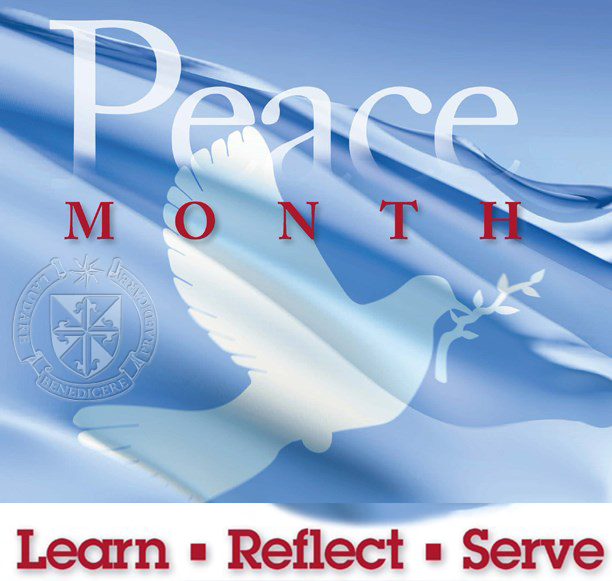

Dominican Month for Peace 2018
The first Dominicans came to the area of DRC in 1912 from Belgium. There is little available/accessible information of the early development of their ministry. Over the years, the friars were joined by the Dominican Missionaries of the Rosary and the Dominicans of Santo Domingo.
During the period of African colonization by Europe, King Leopold II of Belgium acquired the land through a private company as his personal property (1876). The nation of Belgium laid claim to it in 1908 and the Congo Free State was established as a Belgium colony and experienced a typical story of exploitation for the sake of rubber exports. The first Dominicans would have encountered a situation in which millions of Congolese had been slaughtered or enslaved by the colonizers.
The country gained its independence in 1960 and has had continuous political unrest and unstable governments. In 1964, during a civil war there was a massacre in Stanleyville. There were 22 Belgian friars killed along with 13 brothers and 9 sisters. Also killed at that time were four Spanish Dominican sisters. From the archives of the Spanish community we learn:
These four women embraced their missionary vocation embodied in the Congolese people.
The Mission of Stanleyville was opened in March 1960, and three months after the country declared its independence from Belgian rule. It was a time of great confusion, which becomes a breeding ground for ideological manipulation. The departure of the settlers paralyzed the industry, the violence and the chaos were installed in the region, the death of some local leaders and the confrontation of factions between the rebel and military sharpens the crisis.
Our sisters must have undergone multiple needs, lack of resources to care for the sick. However, the solidarity of the people reassured them: “Providence stands by us; as we do something for the poor, so too, we receive the reward. “There was a time a woman brought us bananas, another a hen and thus… the Lord keeps watch on His missionaries”.
Sources: 1964 https://misionerasdominicas.org/en/our-martyrs-of-the-congo/
1964 https://www.op.org/en/content/50th-anniversary-martyrdom-belgian-dominican-friars-and-sisters-congo-1964
The Catholic Church, at that time, was transitioning from being a successful Colonial Church which had established a network of schools, hospitals, social services, etc. throughout the country where about half the population is Catholic. With the advent of Vatican II and the rise of political systems that identified the Church with Belgium exploitation, a new consciousness grew. Since around 1971, the Church became a moral critic of the government and continues to be so. At one point, the government demanded that all Christian/Baptismal names be abandoned, and African names be assumed. Joseph Cardinal Malula objected and was forced into exile for several years. The state declared that Christmas would no longer be a Zairian holiday, banned religious instruction from the schools, and ordered crucifixes and pictures of the pope removed from schools, hospitals, and public buildings; the removed items were replaced by pictures of President Mobutu.
This violent reality continues.
- The Dominican brothers working at St Dominic Church, Limete, Kinshasa, DR Congo were attacked together with their parishioners on Sunday, December 31, 2017. They were attacked by security forces of the Democratic Republic of Congo made up of soldiers and the police.
- The Catholic bishops of the Democratic Republic of Congo, supported by a coalition of civil society groups, called for peaceful demonstrations after Sunday Mass on December 31, 2017, to denounce a new electoral reform law that came into effect on December 25, and to mark the first-year anniversary of the 31 December 2016 political agreement, facilitated by the bishops.
- The government refused permits for the December 31 demonstrations for what it called security reasons, yet more than 160 churches in many parts of the country participated in the call. Police responded with teargas, rubber bullets and even live ammunition. At least seven people were killed and many others seriously injured. Many were also arrested.
- Several police came to St Dominic’s Parish in Kinshasa, run by our Dominican friars, and fired on parishioners in the church grounds and even inside the church. One woman was shot in the forehead by a live bullet, others in their legs, and a friar, Jean Nkongolo, was shot in the face at close range by a rubber bullet.
Source: 2017 https://www.op.org/en/content/attack-dominican-church-kinshasa-dr-congo
The Delegation of the Dominican Order to the United Nations, Dominicans for Justice and Peace, in 2018 identified the DRC as a priority country for its advocacy in the United Nations in Geneva and embarked on a mission to the DRC in July 2018 to visit the Dominicans in Kinshasa and Isiro (Haut Uélé Province). Two training sessions on the UN human rights system were organized to understand the role of the civil society and the engagement of Dominicans in the promotion and protection of human rights. Each training session brought together some forty participants from different branches of the Dominican family, Catholic organizations and non-governmental organizations active in the field of human rights.
Source: https://www.op.org/en/content/training-democratic-republic-congo
Contact: Brigid Clingman, OP, Promoter of Justice, Dominican Sisters~Grand Rapids

